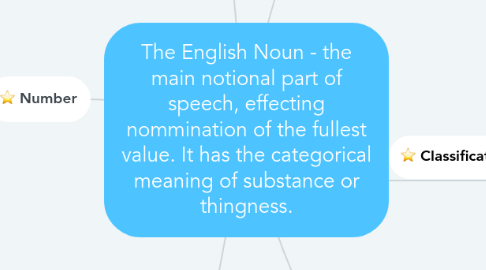
1. Gender
1.1. 2 oppositions
1.1.1. human/non-human
1.1.2. masculine/feminine
1.2. Upper opposition
1.2.1. person nouns
1.2.1.1. strong member
1.2.2. non-person nouns
1.2.2.1. weak member
1.2.2.1.1. oppositional reduction
1.3. Lower opposition
1.3.1. feminine subclass
1.3.1.1. strong member
1.3.2. masculine subclass
1.3.2.1. weak member
1.4. person nouns
1.4.1. feminine nouns
1.4.2. masculine nouns
1.5. non-person nouns
2. Number
2.1. plural
2.1.1. (e) s
2.2. singular
2.2.1. NO SUFFIX
2.3. countable
2.3.1. mouse/mice
2.3.2. cat/cats
2.3.3. mug/mugs
2.4. uncountable
2.4.1. singularia tantum
2.4.1.1. only singular
2.4.2. pluralia tantum
2.4.2.1. only plural
2.5. Oppositional Reduction
2.5.1. the use of absolute plural with countable nouns
2.5.2. the use of absolute plural with uncountable nouns in plural form
2.5.3. common nouns used in repetition groups
3. Case
3.1. 's
3.1.1. "possessive case" or "genitive case"
3.1.2. stylistic colouring
3.1.3. strictly postpositional
3.1.4. morpheme-like by its phonetical properties
3.2. "common case"
3.3. Views
3.3.1. the theory of positional cases
3.3.1.1. inflexional genitive
3.3.1.2. positional nominative, vocative, dative, accusative
3.3.2. the theory of prepositional cases
3.3.2.1. morphological case forms: dative, genitive
3.3.3. the limited case theory
3.3.3.1. genitive, non-genitive (common)
3.3.4. the theory of possessive postposition
3.3.4.1. category of case lost
4. Characteristics
4.1. SEMANTIC
4.1.1. may refer to: a person, a place, a thing, an event, a substance, a quality, an idea, etc.
4.2. MORPHOLOGICAL
4.2.1. typical suffixes
4.2.2. compound stem models
4.3. SYNTACTICAL
4.3.1. substantive
4.3.1.1. subject and object
4.3.2. non-substantive
4.3.2.1. predicative, adverbial,attributive
5. Classifications of Nouns
5.1. type of nomination: proper and common
5.2. form of existence: animate and inanimate
5.3. personal quality: human and non-human
5.4. quantitative structure: countable and uncountable
5.5. type of notion: concrete and abstract
6. Article Determination
6.1. the indetification
6.2. non-indetification
6.2.1. a(n) - Relative Generalisation
6.2.2. Absolute Generalisation

